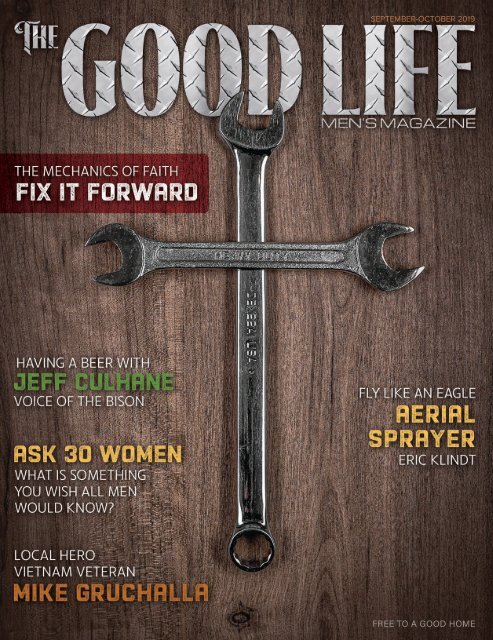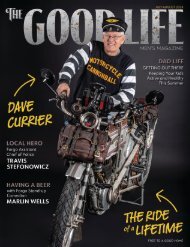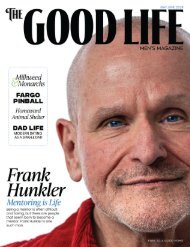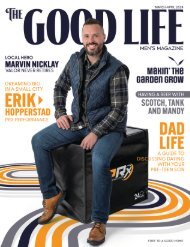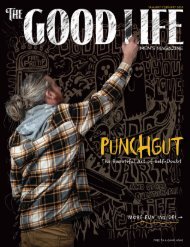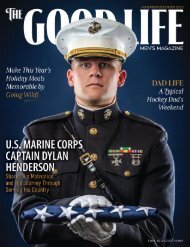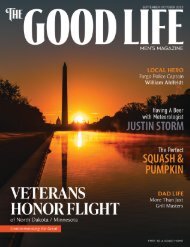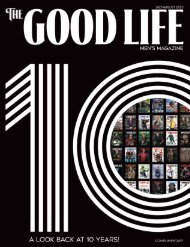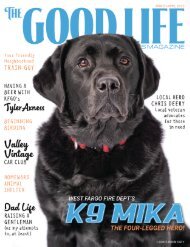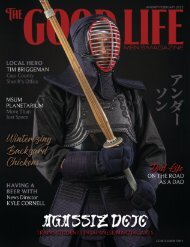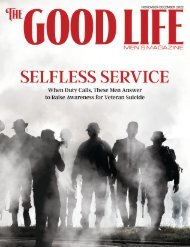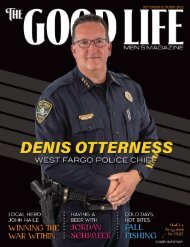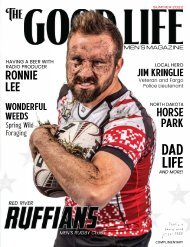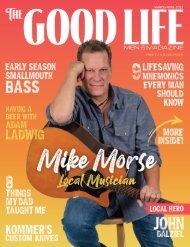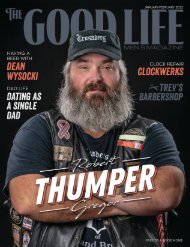The Good Life – September-October 2019
On the cover, Fix It Forward - The Mechanics of Faith, Local Hero, Vietnam Veteran - Mike Gruchalla, Having a Beer with the "Voice of the Bison" and Program Director - Jeff Culhane and more in Fargo Moorhead's only men's magazine.
On the cover, Fix It Forward - The Mechanics of Faith, Local Hero, Vietnam Veteran - Mike Gruchalla, Having a Beer with the "Voice of the Bison" and Program Director - Jeff Culhane and more in Fargo Moorhead's only men's magazine.
Create successful ePaper yourself
Turn your PDF publications into a flip-book with our unique Google optimized e-Paper software.
FATHERS | MR. FULL-TIME DAD<br />
Five Stages of Toddler Sleep<br />
WRITTEN BY: BEN HANSON<br />
It’s 8:02 p.m. Macklin’s mama and I exchange knowing<br />
looks, reluctantly nod our heads and announce to our<br />
audience of one that it’s time for bed. Our nightly dance is<br />
about to begin, and we wonder, as we start the chase, what<br />
new moves may be introduced into the well-worn routine.<br />
it past<br />
Three seconds later, the sounds of<br />
three-year-old fists banging down<br />
doors made clear we hadn’t yet made<br />
stage two.<br />
Some nights, with naive optimism, I think back to the<br />
days when Mack was an infant and wanted nothing more<br />
than a quick night time bottle before being left alone to<br />
fall quickly asleep in his crib. <strong>The</strong>re wasn’t much cuddling<br />
or soothing required in those early days. If you wanted to<br />
sneak a snuggle, you had to risk waking him up by taking<br />
him out of his crib mid-slumber.<br />
It was well worth it — and still is to steal those precious<br />
moments of silent bonding — but lately, we’ve been getting<br />
our fill during the hour-plus emotional extravaganza that is<br />
toddler bedtime.<br />
My wife, Emily, is a highly experienced and sought after<br />
child and adolescent therapist. A real pro, in other words.<br />
I do my best to follow her lead and pick up on the lessons<br />
she teaches through her interactions with Mack. Her<br />
patience rarely expires, but some nights the challenge of<br />
getting Mack into bed (and keeping him there) can push<br />
even her to the limit.<br />
In the middle of one recent bout with an especially tired<br />
boy, she walked out of Mack’s room and announced, “This<br />
is like grief therapy … hoping we hit acceptance here soon.”<br />
2 / THE GOOD LIFE / urbantoadmedia.com<br />
Emily nailed it. Like I said, she’s a pro. Mack’s bedtime<br />
has evolved into what we now call the five stages of<br />
toddler sleep grief. Our goal is to navigate our way<br />
through as quickly and as quietly as possible.<br />
Denial<br />
It’s now 8:02 p.m. … and ten seconds. <strong>The</strong> proclamation<br />
of bedtime has been made, and Mack — right on cue —<br />
issues his retort: “No it’s not.” He’s in full-on denial, often<br />
going even further. “I want to wind up!’ he shouts before<br />
turning his back to make his escape. Next to acceptance,<br />
denial is the easiest stage to get past … I simply catch<br />
him, throw him over my shoulder and march him up to<br />
his room.<br />
Anger<br />
8:05 p.m. Time for some old fashioned kicking and<br />
screaming. It’s best to just keep your distance for a few<br />
minutes and let the little guy wear himself down on his<br />
own. It’s not a fool-proof strategy, but it’s better than<br />
catching an errant kick to the shorts. At some point,<br />
we do have to jump in and pry him out of his clothes<br />
before steering him into the bathroom to pee and brush<br />
teeth … and yes, cry-brushing is a common occurrence,
ut we gotta get those sugar bugs out! Anger is the<br />
least enjoyable stage for obvious reasons. Our secret<br />
weapon is Mack’s low tickle threshold. He loves it, and<br />
uncontrollable giggles always help the transition into<br />
stage three … my favorite of the five.<br />
Bargaining<br />
8:20 p.m. A slightly more tired Macklin turns on his<br />
charm and proceeds with his attempt to disarm us with<br />
an onslaught of surprisingly witty compromises he<br />
hopes will score him a few more minutes of playtime.<br />
<strong>The</strong> most common bargains are “just one more story,<br />
please Daddy?” or “how about some nighttime music, is<br />
that a good idea?” or “will you send Mama in?” Lately,<br />
he’s been very concerned about our new robot vacuum<br />
and requests to double-check that it’s safely “at its home”<br />
before he can really feel settled.<br />
Depression<br />
8:50 p.m. After a good 20-30 minutes of stories, more<br />
bargaining and more tickling, Macklin resigns to the fact<br />
that there is no escaping the inevitable. He’s not getting<br />
out of his room until morning, and the revelation crushes<br />
him. Regardless of who does the reading and the initial<br />
tuck-in, the other parent is consistently called in to<br />
replace the starter mid-way through stage four … and the<br />
back-up always gets the best snuggles. A sad toddler is<br />
sad but oh so loveable. Plus, the second parent gets the<br />
win … ushering Mack calmly into stage five.<br />
Acceptance<br />
9:05 p.m. After fifteen minutes or so of soothing Mack<br />
out of his nightly depression, he rolls over, turning his<br />
back to me and says, “<strong>Good</strong>night, Daddy, you can go<br />
now.” Stage five comes and goes in an instant, and it’s as<br />
comforting to me as it is to him. Once stage five hits, we<br />
rarely hear another sound coming from his room, aside<br />
from perhaps one last visit to the bathroom.<br />
Do I miss infant Mack and his astonishingly easy tuckins?<br />
Absolutely. Do I wish Emily and I would have more<br />
time to ourselves before we crash exhaustedly into our<br />
own bed? Yep. Would I give up his<br />
brilliant bargaining and adorable<br />
acceptance stages to avoid the<br />
other three? Nope. Some day,<br />
not too far out, I’m sure I’ll<br />
miss our nightly sleep grief<br />
therapy sessions every bit<br />
as much as I miss the<br />
other struggles that<br />
seemed so endless<br />
… until they were<br />
over. •<br />
urbantoadmedia.com / THE GOOD LIFE / 3
VOLUME 7 • ISSUE 2<br />
CONTENTS<br />
SEPTEMBER-OCTOBER <strong>2019</strong><br />
2<br />
6<br />
10<br />
14<br />
FATHERS - MR. FULL-TIME DAD<br />
FIVE STAGES OF TODDLER SLEEP<br />
FLY LIKE AN EAGLE<br />
AERIAL SPRAYER ERIC KLINDT REACHES<br />
NEW HEIGHTS<br />
RUSTICA - SIMPLICITY AT ITS FINEST<br />
BACK IN BUSINESS: RUSTICA'S OWNERS<br />
CARRY ON TRADITION<br />
HAVING A BEER WITH - JEFF CULHANE<br />
"VOICE OF THE BISON" AND PROGRAM<br />
DIRECTOR FOR BISON 1660<br />
4 / THE GOOD LIFE / urbantoadmedia.com<br />
18<br />
24<br />
28<br />
30<br />
ON THE COVER - FIX IT FORWARD<br />
THE MECHANICS OF FAITH<br />
FIX IT FORWARD'S IMPACT ON THE<br />
COMMUNITY<br />
LOCAL BAND - THE HUMAN ELEMENT<br />
BETTER TOGETHER<br />
ASK 30 WOMEN<br />
WHAT IS SOMETHING YOU WISH ALL<br />
MEN WOULD KNOW?<br />
LOCAL HERO - MIKE GRUCHALLA<br />
FROM THE MIDWEST TO VIETNAM AND<br />
BACK, MIKE GRUCHALLA'S FOCUS HAS<br />
ALWAYS BEEN DOING HIS JOB WELL<br />
AND FIERCELY SERVING OTHERS
PUBLISHED BY<br />
Urban Toad Media LLP<br />
www.urbantoadmedia.com<br />
OWNER / PHOTOGRAPHER<br />
Darren Losee<br />
darren@urbantoadmedia.com<br />
OWNER / GRAPHIC DESIGNER<br />
Dawn Siewert<br />
dawn@urbantoadmedia.com<br />
CONTRIBUTING WRITERS<br />
Meghan Feir<br />
Ben Hanson<br />
Jessica Kuehn<br />
Krissy Ness<br />
Alexis Swenson<br />
ADVERTISING INQUIRIES<br />
Darren Losee<br />
darren@urbantoadmedia.com<br />
READ A PAST ISSUE<br />
issuu.com/thegoodlifemensmag<br />
FOLLOW US ON FACEBOOK<br />
facebook.com/urbantoadmedia<br />
FOLLOW US ON TWITTER<br />
@urbantoadmedia<br />
FOLLOW US ON INSTAGRAM<br />
@urbantoadmedia<br />
<strong>The</strong> <strong>Good</strong> <strong>Life</strong> Men’s Magazine is distributed six times<br />
a year by Urban Toad Media LLP. Material may not be<br />
reproduced without permission. <strong>The</strong> <strong>Good</strong> <strong>Life</strong> Men’s<br />
Magazine accepts no liability for reader dissatisfaction<br />
arising from content in this publication. <strong>The</strong> opinions<br />
expressed, or advice given, are the views of individual<br />
writers or advertisers and do not necessarily represent<br />
the views or policies of <strong>The</strong> <strong>Good</strong> <strong>Life</strong> Men’s Magazine.<br />
urbantoadmedia.com / THE GOOD LIFE / 5
FLY<br />
LIKE AN EAGLE<br />
Aerial Sprayer Eric Klindt Reaches New Heights<br />
6 / THE GOOD LIFE / urbantoadmedia.com
“<br />
Of all the dangers<br />
that are in a job, with all<br />
the training you do, it just<br />
becomes normal work that<br />
I don’t really think of as<br />
dangerous anymore.”<br />
WRITTEN BY: JESSICA KUEHN<br />
PHOTOS BY: URBAN TOAD MEDIA<br />
Even though many people head to the lakes<br />
in the summertime, you’ll often find Eric<br />
Klindt flying in the sky. As an ag pilot with<br />
Wilbur-Ellis Agribusiness in Wahpeton,<br />
N.D., Klindt is putting his more than 20<br />
years of experience in aerial spraying to<br />
good use.<br />
<strong>The</strong> late David Yaggie from Breckenridge,<br />
Minn., first got Klindt involved with aerial<br />
spraying. Klindt had always wanted to<br />
farm, so he helped Yaggie and his son both<br />
in a tractor on their farm and in a plane<br />
with aerial spraying. Later, he attended<br />
<strong>The</strong> University of Minnesota Crookston,<br />
where he received his commercial pilot’s<br />
license and aerial applicator training.<br />
Even though he really enjoys flying itself<br />
and how every day is different, there’s<br />
something else he loves more than<br />
anything.<br />
“<strong>The</strong> best part is that you get paid to do a<br />
job that you love to do,” he said.<br />
urbantoadmedia.com / THE GOOD LIFE / 7
Eric also uses his plane<br />
to assist in putting out fires<br />
in the community.<br />
Aerial spraying can be dangerous<br />
work, especially when it comes to<br />
the first initial pass with a heavy load<br />
or when you’re taking off a shorter<br />
strip with a full load, but Klindt said<br />
he doesn’t worry about any of that<br />
anymore.<br />
“Of all the dangers that are in a job,<br />
with all the training you do, it just<br />
becomes normal work that I don’t<br />
really think of as dangerous anymore,”<br />
he said.<br />
<strong>The</strong> biggest thing he wants people<br />
to know about aerial spraying is<br />
how much the sprayers care for the<br />
ground, the farmer’s crops and the<br />
environment.<br />
“Some can say that we’re not very<br />
good to the environment by spraying<br />
pesticides, but it’s those pesticides<br />
that help the environment in<br />
controlling weeds and bugs that can<br />
overtake your field,” he said.<br />
One of the most memorable<br />
experiences in his career so far<br />
includes being honored for the<br />
work he’s done in the industry from<br />
the National Agricultural Aviation<br />
Association (NAAA). Another<br />
memorable, albeit sadder, moment<br />
includes doing flyovers at burials<br />
after losing a pilot.<br />
“Those are quite memorable,” he<br />
said. “I mean, that’s something you’ll<br />
never forget for the rest of your life.<br />
<strong>The</strong>re’s probably a lot more I could go<br />
into, but it’s just the fact that you can<br />
do this for a job and basically have<br />
the winters off, even though I find<br />
a lot of stuff to do, that’s rewarding<br />
work.”<br />
According to his bio on Wilbur-Ellis’<br />
website, his motto is “go big or go<br />
home,” which is a message he said he<br />
can’t help but live by, especially when<br />
flying around in his Air Tractor AT-<br />
802.<br />
“I guess there’s nothing I do that’s<br />
little,” he said. “Now in this industry,<br />
it just so happens that I’m flying the<br />
biggest ag plane there is to spray with<br />
in the world, basically, so I can get<br />
a lot done with it, which ultimately<br />
helps the customers and the farmers<br />
that I’m working for.”<br />
With bigger equipment and planes,<br />
more work is being accomplished<br />
more quickly than it used to be,<br />
making the process much more<br />
efficient over time.<br />
“If you go back 20 or 30 years, there<br />
were almost twice as many airplanes<br />
that did our work, but yet the number<br />
of acres that were covered are about<br />
the same, so we cut the planes in half<br />
but we’re still doing the same amount<br />
of work,” he said.<br />
Klindt knows that some people aren’t<br />
fans of the aerial spraying industry,<br />
but he said most of their unhappiness<br />
could be solved with more knowledge<br />
about what they really do.<br />
“Usually the people who don’t like<br />
what we do are just quite ignorant<br />
on what we do,” he said. “I always<br />
say that people claim this stuff is so<br />
Whether it’s cleaning out your toilet or cleaning the countertops, those<br />
chemicals are way more toxic than the stuff that we put in our planes.”<br />
8 / THE GOOD LIFE / urbantoadmedia.com
horrible. <strong>The</strong> stuff under your kitchen sink is way more<br />
toxic than most of the stuff we put out of our airplane, but<br />
you don’t think twice about that. Whether it’s cleaning out<br />
your toilet or cleaning the countertops, those chemicals<br />
are way more toxic than the stuff that we put in our planes.”<br />
He said that they do use toxic chemicals at times, but that<br />
isn’t all that they do, so he wants to help educate more<br />
people about it.<br />
Another aspect that’s important for people to know about<br />
the industry is the importance of family support due to the<br />
long hours that can often vary due to weather.<br />
“If [the family] doesn’t understand the roles and the<br />
sacrifices that they have to give in the summer when<br />
they’re aerial spraying, that makes it very difficult,” he said.<br />
For example, Klindt was in Iowa during this phone<br />
interview, and then he was going to head to Illinois next. He<br />
said that wouldn’t be possible without an understanding<br />
family since he has to be gone often in the summertime<br />
and work long hours, which causes him to miss family<br />
outings and other events.<br />
“If you don’t have a supportive family, it makes it difficult,<br />
and I’m fortunate that I have a wife and kids that<br />
understand that,” he said.<br />
When asked what the good life means to him, he<br />
responded: “To me, the good life is to be able to live in<br />
a faith community, have a decent job, be able to do the<br />
things you want to do and spend time with your family.” •<br />
urbantoadmedia.com / THE GOOD LIFE / 9
RUSTICA<br />
Simplicity at Its Finest<br />
Back to Business: Rustica’s New Owners Carry on Tradition<br />
WRITTEN BY: MEGHAN FEIR • PHOTOS BY: URBAN TOAD MEDIA<br />
Rustica Eatery & Tavern, one of Moorhead’s favorite restaurants,<br />
closed its doors earlier this summer for two weeks. Panic ensued<br />
in the hearts of their patrons. Once they were informed it would be<br />
under new management, a second round of panic took place. This<br />
time, it was concern over potential menu changes. Would people still<br />
be able to get their “burrata fix”? Would the fried chicken and pizzas<br />
still be available? Would those items taste just as good, if they were?<br />
Would people’s taste buds ever dance again?<br />
<strong>The</strong>se and other questions bounced in the minds of many, but<br />
thankfully for these loyal customers, the new management team<br />
happened to be equally loyal employees of Eric and Sara Watson,<br />
the previous owners. Executive chef Micah Leitel has worked at the<br />
restaurant and tavern nearly four years, and Anna Weisenburger took<br />
on her role as front house manager in March.<br />
A month after Weisenburger started, the Watsons approached the<br />
two employees, encouraging them to take over the business. It didn’t<br />
take much convincing. Both Leitel and Weisenburger knew they each<br />
wanted their own restaurant someday. “Someday” just came a lot<br />
sooner than they had imagined.<br />
While it’s inevitable the two will gradually make their mark on the<br />
place, they want to keep Rustica customers happy and satisfied by<br />
keeping staples on the menu and the restaurant vibes the same. <strong>The</strong><br />
homey environment, comforting food and occasional twists regulars<br />
have grown to love will continue being a fixture of Rustica.<br />
Read on to learn more about the new owners and<br />
their unique approach toward working in the<br />
hospitality industry.<br />
10 / THE GOOD LIFE / urbantoadmedia.com
<strong>Good</strong> <strong>Life</strong>: Are there any drastic changes you two have<br />
in the works for this place?<br />
Micah Leitel: Our main goal is consistency. We want to<br />
provide the same experience to the guests they’ve come<br />
to expect. For now, we already have an existing clientele<br />
that love the place, so why mess with that? Give them<br />
what they want in the way they want it. Will it be exactly<br />
the same this time next year? I highly doubt it. It will<br />
always evolve.<br />
Anna Weisenburger: We didn’t<br />
want to rip the rug out<br />
from anybody.<br />
<strong>The</strong>re are some things that just won’t change because<br />
they’re not broken, but we definitely will slowly put<br />
our mark on things.<br />
GL: What’s something unique about how Rustica<br />
functions?<br />
ML: Our kitchen team is pretty awesome. <strong>The</strong>y’re<br />
very dedicated and disciplined, and that’s kind of rare.<br />
Usually, kitchens are very chaotic places, but ours is<br />
serene. Even on a wild Saturday night, nobody’s fighting<br />
with each other. I can’t recall the last argument that was<br />
in the kitchen. That’s something special.<br />
AW: <strong>The</strong>re’s not a lot of drama. Everybody jives together<br />
really well. Another unique thing about our operation<br />
is that we don’t have a specific dishwasher. Everybody<br />
washes dishes back there. If someone isn’t as busy, they<br />
go wash dishes. It is complete teamwork all across the<br />
board. Nobody is too good for anything.<br />
“<br />
We didn’t want to rip the rug out from anybody.<br />
<strong>The</strong>re are some things that just won’t change<br />
because they’re not broken, but we definitely will<br />
slowly put our mark on things.”<br />
— Anna Weisenburger<br />
urbantoadmedia.com / THE GOOD LIFE / 11
GL: Did circumstances or a driving passion lead you<br />
two to where you are now?<br />
ML: I never set out to be a chef, but I’ve worked toward<br />
where I’ve gotten. You experience things and look for<br />
new challenges, and I found a lot of those here. If you<br />
can survive everything, you move on to the<br />
next station or role. I’ve always found that to<br />
be exciting. <strong>The</strong>n you just keep moving and,<br />
eventually, we got to buy the place. That’s<br />
pretty cool.<br />
12 / THE GOOD LIFE / urbantoadmedia.com<br />
AW: I think for people who take this seriously<br />
and make it their career path, the goal is to<br />
eventually own something. It’s often in the far-off<br />
distance, and a lot of us never get to do it, but once you<br />
reach a management role, what else is there, besides<br />
having your own place?<br />
GL: What makes Rustica so special in town?<br />
AW: I think what makes it unique is that it’s so sought<br />
after. It’s the best of the best. It’s comfort food that’s<br />
done really well and we offer really great service.<br />
ML: Simplicity takes a certain amount of confidence<br />
because you don’t have much to hide behind. <strong>The</strong><br />
technique is very apparent right away. That’s the way<br />
I go at it.<br />
AW: I think the space we’re in also contributes to how<br />
unique we are, as well. This is the oldest bar in town.<br />
Guests can walk in and choose if they want to be in<br />
the tavern or the dining room. You get to pick your<br />
experience.<br />
ML: We occupy that odd middle ground between fastcasual<br />
and fine dining, so guests can really choose<br />
their own adventure when they walk in the door.<br />
GL: What does living “the good life” mean to you?<br />
ML: I’d say it’s being satisfied with what you do.<br />
Whatever it is you’re interested in, if you can turn that<br />
into a career, why not? You don’t need to be rich, just<br />
enjoy what you do. If you’re going to spend 13 hours a
day doing something, you should at least like it and<br />
be able to look back on what you did that day with a<br />
measure of pride.<br />
AW: In the same sense, I feel pretty good about<br />
watching the hard work you’ve put into something<br />
make a difference, like turning a negative situation<br />
into a good one with a guest and just seeing results.<br />
We come in here every day and work really hard. If our<br />
guests are happy with what they get from us, that’s a<br />
day that’s been done well.<br />
ML: I think owning this place would be a very poor<br />
idea if we didn’t absolutely love what we do. I love<br />
Rustica. I have so many good memories, and we’re<br />
making more. •<br />
“<br />
Simplicity takes a certain<br />
amount of confidence<br />
because you don’t have<br />
much to hide behind.<br />
<strong>The</strong> technique is very<br />
apparent right away.<br />
That’s the way I go at it.”<br />
— Micah Leitel<br />
urbantoadmedia.com / THE GOOD LIFE / 13
HAVING A BEER WITH | JEFF CULHANE<br />
“<br />
I think I’ve learned that<br />
time and place are very<br />
important when you have<br />
an opinion. To a certain<br />
extent, you may be right<br />
about something, but it<br />
might not be the right<br />
time to share it.”<br />
14 / THE GOOD LIFE / urbantoadmedia.com
HAVING A BEER WITH<br />
JEFF CULHANE<br />
"Voice of the Bison" and Program Director for Bison 1660<br />
WRITTEN BY: MEGHAN FEIR • PHOTOS BY: URBAN TOAD MEDIA<br />
Jeff Culhane’s family has a history — of being in broadcasting,<br />
I mean. His dad and uncle used their voices as announcers for<br />
sporting events on and off the radio. That drew Culhane in.<br />
While his friends would be playing video games, he would be<br />
announcing play-by-plays for them as a kid.<br />
By the time he was 14, Culhane was already working parttime<br />
at a radio station.<br />
After a few years in South Dakota, six years at Husker Sports<br />
Network in Lincoln, Neb., and a stint in Morgantown, W. Va.,<br />
he landed his current role as the official “Voice of the Bison”<br />
for NDSU and the program director for Bison 1660, positions<br />
he’s held for three years. At Bison 1660, Culhane has daily<br />
talk shows and covers football, men’s basketball, baseball<br />
and more. He, along with his team members, tries to cover as<br />
many men’s and women’s sporting events and conferences<br />
as possible.<br />
As we sat in Brewhalla for — what else — a brew and a holla<br />
(sorry), I had the privilege of learning more about the guy<br />
behind the Bison mic.<br />
urbantoadmedia.com / THE GOOD LIFE / 15
HAVING A BEER WITH | JEFF CULHANE<br />
<strong>Good</strong> <strong>Life</strong>: Jeff, you’re from Mitchell,<br />
S.D.?<br />
Jeff Culhane: Yes. <strong>The</strong>y’re famous for the<br />
Corn Palace.<br />
GL: Is Mitchell also famous for other corn<br />
things, like corn hot dishes, corn drinks<br />
and corn candy?<br />
JC: Not really. <strong>The</strong> Corn Palace gift shop has a<br />
lot of candy corn stuff and corncob heads and<br />
who knows what else. My parents actually<br />
own a sports bar right across the street from<br />
the Corn Palace, so corn chowder is on the<br />
menu.<br />
GL: It better be.<br />
GL: Did you have to do some vocal<br />
coaching to get your radio voice, or<br />
did all your practice in elementary school<br />
pay off?<br />
JC: I like to say I have a face for radio and a<br />
voice for newspaper. Not really. I have noticed<br />
through the years how certain things affect it,<br />
like if I drink a sugary drink. On a football game<br />
day, which is long and energetic, I’ll stay away<br />
from any pop and ice-cold water. That sounds<br />
weird, but I know how it makes me feel. I can’t<br />
eat close to or during a broadcast. My wife<br />
Sarah and I have a tradition called Game<br />
Day Breakfast. It’s usually a combination of<br />
eggs, bacon, pancakes or waffles. But, yeah;<br />
no schooling or coaching for the voice. I just<br />
have a feel for what makes my voice strong<br />
or weak.<br />
GL: Did you ever have to work on getting rid of an accent?<br />
Like me — I obviously have a very strong accent of sorts.<br />
Some people think I’m Canadian. I’m not. Some people think I’m<br />
from Alabama. I don’t know. Did you have to work on getting rid<br />
of yours?<br />
JC: Not really. When I get into the broadcast mode, I don’t have the<br />
upper Midwest sound. It’s not too over the top either way.<br />
GL: Yeah, you have a very neutral voice.<br />
JC: I was actually told from a southern school I applied for at one point<br />
that I sounded too northern.<br />
GL: Oh, my goodness. “<strong>The</strong> confederacy can’t handle it.”<br />
JC: That was a legit response from the school. So it’s real. Call it<br />
whatever you want to call it, but you have to sound like the locals to a<br />
certain degree.<br />
GL: Vocal prejudice.<br />
JC: <strong>The</strong>re you go. In this day and age, get outraged.<br />
GL: That’s right. Get upset.<br />
GL: What’s one of your hobbies outside of work?<br />
JC: I like to play golf. I recently told my wife that if we’re ever lucky<br />
enough to retire, a goal would be to play a golf course in every state of<br />
the Union. That would be fun. I’m not very good, but I like to play and I<br />
like to hang out with the guys or Sarah. We just had our first child five<br />
weeks ago, so I would say he’s my number one hobby now.<br />
GL: Congrats! Whoa, that’s a fresh baby.<br />
JC: Thank you. Yes, he’s fresh, in more ways than one. He’s taken<br />
things over, certainly for the better.<br />
GL: What’s your favorite movie?<br />
JC: Saving Private Ryan. I was in high school when it came out, and<br />
I went there with a friend. Of course, when you’re 15 or 16 years old<br />
16 / THE GOOD LIFE / urbantoadmedia.com
— or guys at any age — crying or<br />
showing any emotion is just not<br />
something you’re quite expected<br />
to do. I remember we sat there<br />
after it ended and we just kind of<br />
looked at each other like, “Who’s<br />
going to say something first?”<br />
It was just such an amazing<br />
account of D-Day, Normandy and<br />
sacrifice.<br />
GL: What’s one of your<br />
biggest personality traits<br />
that have changed since you<br />
were in your early 20s.<br />
JC: I’m quieter than I was then. I<br />
think I’ve learned that time and<br />
place are very important when<br />
you have an opinion. To a certain<br />
extent, you may be right about<br />
something, but it might not be<br />
the right time to share it. I don’t<br />
think there’s anything wrong<br />
about saying what you feel, but<br />
I definitely do think that if you’re<br />
looking to continue improving<br />
relationships and connect with<br />
people, or you’re looking to<br />
improve your career, it’s okay<br />
to not say something from time<br />
to time. That doesn’t mean you<br />
can’t say it at some point.<br />
GL: What’s one thing<br />
you’re really into, almost<br />
like an obsession — besides<br />
sports?<br />
JC: I would probably now say,<br />
my son. As every parent that will<br />
read this knows, it’s just different.<br />
He and Sarah have been<br />
constantly on my mind as she’s<br />
still on maternity leave. I’ve been<br />
thinking about the future and<br />
how to do what’s best and how to<br />
provide, protect and guide, stuff<br />
that was as far away as you could<br />
think it would be a year ago.<br />
GL: What does living the<br />
good life mean to you?<br />
JC: What I’m doing right now. •<br />
urbantoadmedia.com / THE GOOD LIFE / 17
ON THE COVER | FIX IT FORWARD<br />
THE MECHANICS OF FAITH<br />
FIX IT FORWARD'S IMPACT ON THE COMMUNITY<br />
WRITTEN BY: MEGHAN FEIR • PHOTOS BY: URBAN TOAD MEDIA<br />
Auto mechanics. <strong>The</strong>y’re often met with mistrust.<br />
Women, specifically, have been told to watch out for<br />
mechanics that take advantage of the fact that many<br />
girls (myself included) don’t know a whole lot about cars,<br />
although, let’s be honest; many guys don’t either.<br />
Throw that stereotype out the window and imagine what<br />
a car obsession and philanthropy could accomplish<br />
when joined forces.<br />
Matt Carlson and Jeremy Jensen have been car hobbyists<br />
for years. <strong>The</strong>y’re probably the type of guys who tried to<br />
soup up their Hot Wheels as kids, but starting an auto<br />
care shop was never a bucket list item — for either of<br />
them.<br />
Carlson and Jensen met when they attended Moorhead<br />
High School in the ’90s. Years later, they both wound up<br />
at Microsoft and reconnected. It was there where they<br />
creatively merged their passion for cars with their desire<br />
to help others.<br />
Four years ago, their dream became a humble reality<br />
with the beginnings of what is now known as Fix It<br />
Forward Ministry.<br />
A <strong>Life</strong> of Service<br />
Mark 10:45<br />
For even the Son of Man did not come to be served, but<br />
to serve, and to give His life as a ransom for many.<br />
After 15 years of working a stable, well-paying job,<br />
Carlson took the leap and began working for Jeremy’s<br />
and his brainchild, Fix It Forward Ministry.<br />
18 / THE GOOD LIFE / urbantoadmedia.com
“It was a difficult leap,” Carlson said, “but it was a good<br />
time for me to move on, and things fell into place. I felt<br />
like I was called to do this. We really felt like God led us.”<br />
Carlson and Jensen first ran the ministry on a private<br />
property out of town, but the limitations and location<br />
made it difficult. <strong>The</strong>ir shop, while sizable for a residence,<br />
wasn’t large enough to service and store many vehicles.<br />
<strong>The</strong>y also lacked a fenced-in space that could house<br />
donated cars. Despite these frustrations, they still knew<br />
this was what they were supposed to do.<br />
— the perfect spot to start their next idea — an auto care<br />
shop to support the ministry.<br />
“We came up with the idea of just creating the shop and<br />
have it pay for the heat, electricity and the rent. We were<br />
able to get this big building that has enough room for<br />
everyone to work, and by having a regular automotive<br />
shop, we were able to get insurance,” Carlson said. “<strong>The</strong><br />
more we can grow the auto shop, the more we can grow<br />
the ministry because all the equipment is used for both.”<br />
“We found out that if you give away your services,<br />
it’s going to grow quickly,” Carlson said. “We started<br />
by working with the YWCA, and then we went to the<br />
Rape and Abuse Crisis Center. Lots of people have<br />
transportation issues, but if you’re a single mom with five<br />
kids, transporting is really difficult, so we thought we’d<br />
focus on that area. <strong>The</strong>n we went to the homeless shelters<br />
and 40 other organizations in the F-M community.”<br />
As Fix It Forward swiftly grew, they acquired their 501(c)<br />
(3) as a nonprofit and began giving away donated cars<br />
they repaired. Soon a shop with 6,000 square feet,<br />
private offices and a fenced-in area went on the market<br />
urbantoadmedia.com / THE GOOD LIFE / 19
ON THE COVER | FIX IT FORWARD<br />
<strong>Good</strong> Stewards<br />
Throughout this process, God’s impeccable timing and<br />
creative way of providing for every need have reassured<br />
and encouraged Carlson and Jensen.<br />
“Before we changed our name and realized we needed<br />
to start a shop, someone at Jeremy’s church wanted to<br />
help with graphic design. We said, ‘That’s great, but<br />
we don’t really need anything.’ Two months later, we<br />
decided to start the shop and didn’t have a name, a logo<br />
or anything,” Carlson said.<br />
“He saw what we needed before we realized we needed<br />
it,” Jensen said. “By the time we had the building, he had<br />
everything laid out. He was like, ‘Here’s the logo, here’s<br />
the name, here are the colors.’ God put Stephen Dorsey<br />
in our path and knew the exact time we needed him, even<br />
though we had no clue we would. <strong>The</strong> whole ministry<br />
has been one thing like that after another.”<br />
<strong>The</strong> people that have stepped up to the plate to help<br />
the Fix It Forward journey take off have a wide array of<br />
skill sets that are necessary for the mission’s success.<br />
Carlson and Jensen stay in their lane and allow other<br />
experts to assist them as they help those in need to gain<br />
independence and safety. This is one reason they rely on<br />
the organizations to provide the donees.<br />
“It comes back to being good stewards,” Jensen said.<br />
“We want to take the resources God’s given us, whether<br />
it’s financial or people’s time, and apply those in the most<br />
efficient ways possible. Part of that process is making<br />
sure we’re not trying to do those things we’re not called<br />
to do and avren’t skilled to do — letting the organizations<br />
do their work so we’re efficient on our end.”<br />
“We want to give cars to people so they can get that job and<br />
get out of the shelter or away from that abusive person —<br />
whatever it takes so they can be self-sufficient,” Carlson<br />
said. “<strong>The</strong>se case managers are great at identifying the<br />
people who are in that spot. We’re not. We fix the cars.”<br />
Sticking to their interest in fixing cars for a purpose and<br />
allowing others to help them along the way has been<br />
the most efficient way of growing their business and<br />
20 / THE GOOD LIFE / urbantoadmedia.com
“<br />
We attract people who are<br />
really excited about our<br />
mission, so it’s not just that<br />
they want to turn a wrench;<br />
they want to give back.”<br />
— Matt Carlson, President<br />
ministry. Both Carlson and Jensen encourage<br />
others to use their interests to help others in<br />
unique and practical ways.<br />
“Take the skills God has given you and help<br />
others,” Jensen said. “Take that gift, that passion<br />
and focus it on something bigger than you.”<br />
Finding Purpose<br />
For too many people, work is a source of,<br />
well, very little, besides earning income and,<br />
hopefully, benefits. Sure, you may have a friend<br />
or two at your job, one you can share memes<br />
with for an occasional laugh, but it might be<br />
hard to feel that sense of meaning.<br />
It’s for this very reason that people have<br />
sought out work at Fix It Forward Auto Care.<br />
Carlson and Jensen have never had to post<br />
job advertisements because the reward of the<br />
purpose is so palpable.<br />
“We have six employees here now. We haven’t<br />
ever put an ad out to hire someone,” Carlson<br />
said. “God keeps dropping the right people<br />
in place for us. That’s kind of unique in this<br />
industry.”<br />
As with many blue-collar jobs, there has been<br />
a national shortage of auto mechanics, and the<br />
turnover rate can be high. For Fix It Forward<br />
employees and volunteers, the impact their<br />
work makes in the lives of others keeps them<br />
satisfied.<br />
urbantoadmedia.com / THE GOOD LIFE / 21
“We attract people who are really excited about our<br />
mission, so it’s not just that they want to turn a wrench;<br />
they want to give back,” Carlson said.<br />
“It’s a job with a big bonus,” Jensen said. “It’s very hard<br />
to find a career or a paying job in this industry that has<br />
that purpose or mission tied to it where you can go to<br />
work not only to achieve wages but to give back to the<br />
community, too.”<br />
Fix It Forward Auto Care opened 16 months ago and<br />
continues to grow alongside the ministry. <strong>The</strong>y currently<br />
have six employees and had over 75 volunteers involved<br />
with the mission in 2018. <strong>The</strong>y’ve also been able to fix<br />
up and give away 178 cars to those in need. That number<br />
continues to grow because of the generosity of others.<br />
Many of Fix It Forward’s volunteers are a part of Carlson<br />
and Jensen’s church families. It’s been a well-received<br />
opportunity, especially for the men of their congregations.<br />
“One of the struggles of the church is to get men<br />
involved. Statistically, if a man is involved in his faith,<br />
the family follows, but how do you get men involved in<br />
the churches? Most men don’t want to serve cupcakes<br />
at funerals. That’s not our calling, and nobody wants<br />
Jeremy singing in the choir,” Carlson said. “So you have<br />
to provide opportunities for these guys. For a percentage<br />
of the population of the congregation, this gets them<br />
involved.”<br />
Living the <strong>Good</strong> <strong>Life</strong><br />
When asked how they would describe what “living the<br />
good life” means to them, the friends’ answers were as<br />
meaningful as their mission.<br />
“I think as I grow and, hopefully, become wiser, living<br />
the good life is following the pattern that Jesus laid out,”<br />
Jensen said. “Living the good life is doing the best I can<br />
to take what God has given me and do good for others on<br />
the path he has for me. It really comes down to that —<br />
that giving back and living a life of service.”<br />
“My thought is basically living out your faith,” Carlson<br />
said. “Jeremy and I are both doers. One of my favorite<br />
mottos is ‘Less talk. More do,’ so living out the faith is<br />
going out there and doing those things that your faith<br />
talks about, which is serving others. It’s a different way<br />
of saying the exact same thing that Jeremy said, but that’s<br />
22 / THE GOOD LIFE / urbantoadmedia.com
probably why we work on so much<br />
together. I think most of the people<br />
working with us would answer in<br />
the same way. <strong>The</strong>y feel that need<br />
to serve.”<br />
Get Involved<br />
If you would like to get involved<br />
with the ministry, here are a<br />
number of ways you can help their<br />
efforts grow.<br />
1 Volunteer. Help fix cars during<br />
the evenings or weekends, or offer<br />
to visit with clients as they wait for<br />
their cars.<br />
2 Donate your car, if your car is<br />
repairable.<br />
3 Give a gift. Cash donations help<br />
pay for the car parts.<br />
4 Get your car fixed at Fix It<br />
Forward Auto Care. This is how<br />
they keep the heat and lights on<br />
and how the ministry stays afloat.<br />
In order to receive help from<br />
Fix It Forward, each individual<br />
must have a referral from a case<br />
manager connected to the YWCA,<br />
Rape and Abuse Crisis Center, or<br />
one of the 40 organizations Fix It<br />
Forward Ministry works with on a<br />
case-by-case scenario. •<br />
“<br />
Living the good life is<br />
doing the best I can to<br />
take what God has given<br />
me and do good for<br />
others on the path he<br />
has for me. It really comes<br />
down to that — that<br />
giving back and living a<br />
life of service.”<br />
— Jeremy Jensen, Vice<br />
President<br />
urbantoadmedia.com / THE GOOD LIFE / 23
LOCAL BAND<br />
THE HUMAN ELEMENT<br />
Better Together<br />
WRITTEN BY: KRISSY NESS<br />
PHOTOS BY: URBAN TOAD MEDIA<br />
Interviewing local Fargo-<br />
Moorhead bands has<br />
become the highlight of<br />
my life these days. From<br />
meeting new people and<br />
listening to music I know<br />
or I am hearing for the<br />
first time is such a rush<br />
and always a treat.<br />
For this article, I had the<br />
pleasure of interviewing<br />
the members of <strong>The</strong><br />
Human Element. Seth<br />
Holden is on drums and<br />
is the resident comedian<br />
(although they are all<br />
hilarious), Matt Johnson<br />
is their lead guitarist and<br />
sings vocals, Brant Niemi<br />
is their bass player and<br />
bookkeeper, and Kari<br />
Marie plays they keyboard<br />
and sings vocals.<br />
“We’ve been playing since<br />
2015 as a band - Seth,<br />
Kari, and myself and<br />
Brant came aboard in<br />
2018,” Said Matt. With<br />
that being said they have<br />
been playing music for<br />
many years, whether it’s in<br />
other bands like O’Fosho,<br />
Sovereign Sect, Living In<br />
Tent City, or just jamming -<br />
these four have talent like<br />
no other.<br />
Before adding Brant to the<br />
band they group can agree<br />
there was something<br />
missing. “Brant was like<br />
the Ironman that put the<br />
ship back together,” said<br />
Kari Marie. “He is our<br />
magical unicorn,” added<br />
Matt.<br />
Although his band mates<br />
are singing his praise, the<br />
love they all have for each<br />
other is admirable. Our<br />
interview was a mere 35<br />
minutes, definitely one of<br />
the shortest interviews<br />
24 / THE GOOD LIFE / urbantoadmedia.com
“<br />
When we were<br />
talking about what<br />
we should call<br />
ourselves once we<br />
decided this was<br />
a cohesive unit,”<br />
said Kari Marie,<br />
“one of the things I<br />
thought was quite<br />
prevalent is that<br />
regardless if we<br />
have original music<br />
or if we are playing<br />
cover tunes is that<br />
we each bring our<br />
own element or we<br />
each bring our own<br />
humanity to the<br />
songs.”<br />
urbantoadmedia.com / THE GOOD LIFE / 25
LOCAL BAND | THE HUMAN ELEMENT<br />
I’ve ever conducted, but it was filled with so<br />
much laughter, knowledge, and love that I felt<br />
like I’d been friends with them for years.<br />
What does <strong>The</strong> Human Element mean, you<br />
might be asking yourself?<br />
“When we were talking about what we should<br />
call ourselves once we decided this was a<br />
cohesive unit,” said Kari Marie, “one of the<br />
things I thought was quite prevalent is that<br />
regardless if we have original music or if we<br />
are playing cover tunes is that we each bring<br />
our own element or we each bring our own<br />
humanity to the songs.”<br />
No matter how hard you try you can never<br />
recreate what the original artist made, but you<br />
can bring your own element to that cover.<br />
<strong>The</strong> Human Element describes their sound as a<br />
mix of funk and singer-songwriter. It is definitely<br />
music you want to get up and move to and you<br />
really feel connected to the band when they play.<br />
“<strong>The</strong> music is so much better when you love<br />
who you play it with and love what you do,” said<br />
Seth. “It has got to be fun” added Matt.<br />
26 / THE GOOD LIFE / urbantoadmedia.com
As a group, <strong>The</strong> Human Element doesn’t take their<br />
music lightly but they approach it with a lighthearted<br />
attitude and correct their errors with little<br />
to no confrontation.<br />
“We never dwell on mistakes we’ve made while<br />
were playing or after,” said Seth. “ We may chuckle<br />
about it after the show, but then (that mistake) will<br />
never happen again.”<br />
It is easy to tell by talking with one or all the<br />
members, attending a show, or listening along in<br />
your car that they really love what they do when<br />
they are playing together in this band.<br />
“We never obsess over how we played in the show,<br />
we obsess over how fun it was to play the show,”<br />
Matt. “<strong>The</strong>re is always musicians to play with, but<br />
there is not always musicians to play together,”<br />
added Seth.<br />
<strong>The</strong>re is more to just music when it comes to<br />
shows though, “<strong>The</strong> sound and light crew are just<br />
as equally important as we are,” said Kari Marie.<br />
“It’s not always just that the songs were good, it’s<br />
how does the audience look, how crisp was the<br />
kick drum, can I hear Matt’s guitar or Kari’s Keys?”<br />
added Brant.<br />
Everyone brings their own special part to a band<br />
whether it is songwriting, composing, or making<br />
sure the sound quality is the best it can be.<br />
“We’ve been elevated to another level of magical<br />
playing since we’ve had Brant,” said Kari Marie.<br />
<strong>The</strong> Human Element is in the process of recording<br />
a live album along with their third studio album,<br />
the date is not set yet, but you can find their music<br />
on iTunes, Spotify, Orange Records in downtown<br />
Fargo or at any one of their shows.<br />
For all upcoming shows check out their Facebook<br />
page and check out some of their live shows on<br />
YouTube, you won't be disappointed. •<br />
urbantoadmedia.com / THE GOOD LIFE / 27
ASK 30 WOMEN<br />
WHAT IS SOMETHING YOU WISH ALL MEN<br />
WOULD KNOW?<br />
“Yeah, I know.” “I knew that already.” “I know everything.”… False! You know some things, but not<br />
everything, about the important ladies in your life. You really don’t, and we can prove it. We asked 30<br />
women “What is something you wish all men would know?”<br />
1. Don’t try to fix it - just listen!<br />
2. Chivalry is not dead. We<br />
always appreciate when you<br />
hold open doors, or offer to carry<br />
our things.<br />
3. Women are like cats. We<br />
want attention when we want<br />
attention. But too much and we<br />
might bite/claw/scratch.<br />
4. Reaching to hold hands in the<br />
car or in public actually means<br />
a lot.<br />
5. It’s not always about the<br />
big extravagant things. Little<br />
gestures like doing laundry and<br />
dishes are appreciated.<br />
6. When you leave the toilet seat<br />
up, we fall in. It’s not fun getting<br />
wet buns!<br />
7. It’s the little<br />
things that<br />
mean a lot.<br />
8. <strong>The</strong>re is<br />
nothing<br />
wrong with<br />
owning an<br />
expensive<br />
handbag.<br />
Nothing!<br />
11. When we are venting, a<br />
great question to ask is, “Are<br />
you just venting or do you want<br />
me to help you solve this issue?”<br />
Because sometimes we just<br />
need to get it out but we will<br />
handle it on our own.<br />
12. Even strong and<br />
independent women appreciate<br />
hugs, hand holding, and kisses<br />
on the forehead.<br />
13. Women like to be told they<br />
look nice. Everyone likes to be<br />
complimented.<br />
14. “You look fine” is not an<br />
acceptable answer.<br />
15. How lucky you are to not<br />
have to sit on a toilet in a public<br />
restroom.<br />
16. <strong>The</strong>y<br />
should know<br />
women are the<br />
stronger sex.<br />
19. <strong>The</strong>y could avoid two<br />
hour long conversations by<br />
communicating well for five<br />
minutes.<br />
20. We always notice when you<br />
check out another woman. No<br />
matter how hard you try to hide<br />
it - we know.<br />
21. We love any romantic<br />
gesture.<br />
22. How much cramps hurt.<br />
23. No matter what we say,<br />
we always appreciate things<br />
like unexpected flowers or<br />
compliments or just coming up<br />
behind us for a hug that isn’t<br />
attached to any expectations.<br />
FLOWERS?<br />
IT'S NOT EVEN<br />
MY BIRTHDAY!<br />
24. We like Star<br />
Wars too.<br />
25. We shave<br />
our legs for<br />
you, not<br />
ourselves.<br />
26. A man<br />
who cooks is a<br />
dream come true.<br />
27. We take so long getting<br />
ready to look good for you.<br />
9. We know<br />
they’re not gonna<br />
understand us, but<br />
at least try.<br />
10. Money<br />
is not<br />
impressive.<br />
28 / THE GOOD LIFE / urbantoadmedia.com<br />
17. How to put the lid<br />
down.<br />
18. We need<br />
to hear “I love<br />
you” even if<br />
you are out<br />
with your guy<br />
friends.<br />
28. I need to hear how you feel<br />
about me often.<br />
29. Stop competing and start<br />
listening. It's a team project, not<br />
a race.<br />
30. My mood swings are<br />
hormonal, not personal.
urbantoadmedia.com / THE GOOD LIFE / 29
LOCAL HERO | MIKE GRUCHALLA<br />
WRITTEN BY: ALEXIS SWENSON<br />
PHOTOS BY: URBAN TOAD MEDIA<br />
When Mike Gruchalla arrived in<br />
Saigon, Vietnam on January 11, 1970,<br />
he hit the ground rolling - literally.<br />
“As soon as we touched down at the<br />
airport base ... the Viet Cong started<br />
mortaring us. <strong>The</strong> airplane got to the<br />
end of the runway, started taxiing<br />
back, lowered the back ramp on<br />
the airplane ... we exited while the<br />
airplane was still taxiing ready to<br />
take off. So, I hit the ground rolling,”<br />
explained Gruchalla.<br />
Merely seven months prior the<br />
19-year-old had been drafted to serve<br />
in the Vietnam War.<br />
“I drafted and then I enlisted [in the<br />
Army] because my older brother had<br />
gone AWOL. I figured that if I enlisted<br />
and volunteered to be a medic and<br />
got sent to Vietnam, it would keep<br />
my brother out of Vietnam,” said<br />
Gruchalla.<br />
30 / THE GOOD LIFE / urbantoadmedia.com<br />
Gruchalla volunteered to be a medic<br />
simply because he knew they were<br />
needed and assumed it would send<br />
him to Vietnam.<br />
In August 1969, Gruchalla left for<br />
Fort Lewis, Washington to complete<br />
basic training followed by Advanced<br />
Individual Training (Gruchalla’s<br />
medic training) in Fort Sam Houston,<br />
Texas. After the abbreviated training,<br />
Gruchalla went home for Christmas<br />
leave and arrived in Vietnam on<br />
January 11, 1970.<br />
<strong>Life</strong> in Vietnam<br />
Gruchalla felt life at base camp was far<br />
less appealing than getting out in the<br />
field and often volunteered for patrol<br />
with any group that wanted a medic.<br />
“I didn’t like being at base camp<br />
where I had to have spit-shine shoes,<br />
a pressed uniform; I wanted to do my<br />
job,” said Gruchalla.<br />
This willingness to go out with anyone<br />
— Koreans or other allies — exposed<br />
Gruchalla to extremely dangerous<br />
situations. In the course of nearly 2<br />
years, Gruchalla found himself in 15<br />
different tunnels, being shot, surviving<br />
four helicopter crashes, and being run<br />
over by a tank.<br />
Earning the Combat Medical<br />
Badge Medal<br />
Most memorably, Gruchalla cites the<br />
event that earned him the Combat<br />
Medical Badge Medal, because,<br />
“there were only 2,231 combat medic<br />
badges awarded in Vietnam.”<br />
“On July 2nd, I was sent out to a<br />
firebase ... <strong>The</strong> night of the 2nd, we<br />
got attacked. When the attack started<br />
the enemy was playing Johnny Cash,<br />
Charlie Pride, and other country<br />
songs over loudspeakers in the jungle.<br />
Over a period of five or six hours, we<br />
threw everything at them we had.
“<br />
That badge says I did<br />
my job. I think I did<br />
it well. I wish I could<br />
have saved more,<br />
but there’s only so<br />
much you can do.”<br />
<strong>–</strong> Mike Gruchalla<br />
urbantoadmedia.com / THE GOOD LIFE / 31
LOCAL HERO | MIKE GRUCHALLA<br />
We even lowered the guns and fired<br />
beehive rounds (155 howitzer with<br />
seal darts), said Gruchalla.<br />
“... I was dragging a wounded soldier<br />
into the command bunker with the<br />
help of another guy. A satchel charge<br />
went off in front of us, blew me into<br />
the tunnel, and as soon as I got into<br />
that tunnel, they blew it. That sealed<br />
the entrance.<br />
“<strong>The</strong>re were 38 of us in the bunker<br />
and we called in an A-B52 strike on<br />
our position. When it was all done,<br />
63 GI’s died. 38 of us got off. I was<br />
number 38.<br />
“When we got dug out, it was my job<br />
to tag and bag the 63 guys. <strong>The</strong> first<br />
guy that I tagged and bagged was<br />
the guy that was helping me with the<br />
wounded man. He had the flag from<br />
that firebase inside his shirt. And, I<br />
32 / THE GOOD LIFE / urbantoadmedia.com<br />
have that flag today,” said Gruchalla.<br />
According to the American War<br />
Library, the Combat Medical Badge<br />
Medal was established to recognize<br />
medical personnel who experienced<br />
combat while providing medical<br />
assistance to wounded personnel.<br />
“That badge says I did my job. I think<br />
I did it well. I wish I could have saved<br />
more, but there’s only so much you<br />
can do,” said Gruchalla.<br />
Gruchalla’s Medals<br />
Gruchalla also received a Purple<br />
Heart Medal, a Bronze Star Medal,<br />
and a Silver Star Medal, but the only<br />
paperwork he has is for the Combat<br />
Medical Badge Medal.<br />
“When I came home from Vietnam, it<br />
took me 4 months to get my things …<br />
<strong>The</strong>y were going through and taking<br />
things out ... because they made<br />
references to where I was,” explained<br />
Gruchalla.<br />
Gruchalla reasons that the paperwork<br />
was confiscated because he carried<br />
out some of his work in Cambodia<br />
and Laos <strong>–</strong> a direct violation of<br />
international law.<br />
“We weren’t supposed to be there,”<br />
said Gruchalla.<br />
Per military rules, an individual is<br />
allowed to wear their medals if they<br />
have paperwork to verify earning<br />
them. As such, Gruchalla continues<br />
to be denied from wearing the<br />
medals. Initially frustrated, he has<br />
now reached a resolve of sorts.<br />
“It hurt at first, but it doesn’t matter<br />
now. My dad saw my medals and<br />
that’s all that counts,” said Gruchalla.
“<br />
It hurt at first, but it<br />
doesn’t matter now. My<br />
dad saw my medals and<br />
that’s all that counts.”<br />
<strong>–</strong> Mike Gruchalla<br />
Coming Home<br />
Despite diligently doing his job to help fellow soldiers,<br />
Specialist Spc. 4 Gruchalla’s homecoming was<br />
characterized by a negative public perception of<br />
Vietnam veterans.<br />
“... On the flight from Minneapolis to Fargo, the only<br />
seat that was available was first class. <strong>The</strong>re was a guy<br />
sitting in the window seat next to me. As soon as the<br />
plane took off, he went and sat with the stewardesses;<br />
he didn’t want to sit by a Vietnam vet. When we landed<br />
in Fargo, nobody got off the plane until I did. <strong>The</strong>y all<br />
waited at the back of the baggage claim area until I got<br />
my bag and walked out the door,” said Gruchalla.<br />
In the following weeks, Gruchalla determinedly<br />
attempted to register for college.<br />
“I dressed the part <strong>–</strong> bell-bottoms, shirt with puffy<br />
sleeves, the beads, the whole thing. But, I went up to<br />
the registrar's office and pretty much got chased off of<br />
urbantoadmedia.com / THE GOOD LIFE / 33
LOCAL HERO | MIKE GRUCHALLA<br />
Moorhead State. I had short hair,<br />
I was a Vietnam vet, I was a ‘baby<br />
killer’, said Gruchalla.<br />
“I went home. I spent four months<br />
in my folks’ basement growing out<br />
my hair. I didn’t go out for anything<br />
because I didn’t know if I would be<br />
accepted for having medium length<br />
hair,” said Gruchalla.<br />
A Continued Medical Career<br />
Eventually, Gruchalla acquired a<br />
job in the medical field, continuing<br />
to care for hurting people. For 10<br />
years, he worked at Dakota Hospital<br />
for orthopedic surgeons. <strong>The</strong>n,<br />
he spent the next 27 years at the<br />
Fargo VA Hospital working in the<br />
operating room.<br />
Gruchalla saw firsthand how much<br />
of what the medics learned in<br />
Vietnam was put into practice on<br />
American soil.<br />
“It was a slow process, but it went<br />
from ambulances basically being<br />
34 / THE GOOD LIFE / urbantoadmedia.com<br />
a meat wagon ... to someone riding<br />
in the ambulance able to initiate<br />
medical treatment. And, with that,<br />
the use of helicopters to transport<br />
because we found out in Vietnam<br />
that we only had basically an hour<br />
before things would permanently<br />
die,” said Gruchalla.<br />
“My Lives as a Medic”<br />
At the consistent urging of a VA doctor<br />
and Gruchalla’s now-wife, Gruchalla<br />
authored a book outlining the stories<br />
he carries from the Vietnam War. He<br />
was reluctant at first, in part due to<br />
his dyslexia which made the writing<br />
process challenging, though he’s glad<br />
now that he wrote it.<br />
“My Lives as a Medic: A Soldier’s<br />
Journal in Vietnam” provides a<br />
raw, honest memoir of Gruchalla’s<br />
experience in the Vietnam War.<br />
Giving Back Today<br />
Gruchalla wasn’t always involved - or<br />
invited - into veterans organizations.<br />
“When I first came home, the VFWs<br />
and the American Legions called me<br />
... they both told me they didn’t want<br />
me. ‘Vietnam was not a war ... we<br />
don’t want the Vietnam vets’,” said<br />
Gruchalla.<br />
Many years later, prompted by the<br />
positive change in the public’s view<br />
of Vietnam veterans, Gruchalla<br />
joined the VFW, AM Vets, Disabled<br />
American Veterans, and Vietnam<br />
Veterans of America.<br />
Gruchalla helps the Vietnam<br />
Veterans of America with their 5K<br />
and 10K races as a crossing guard<br />
and is involved with the Fargo<br />
Moorhead Vietnam Veterans Week<br />
in May.<br />
Furthermore, for the past four years,<br />
Gruchalla has volunteered with<br />
the Veterans Honor Flight of ND/<br />
MN, a nonprofit created solely to<br />
honor America’s veterans for their<br />
sacrifices. He assists in Honor Flight<br />
fundraising events and has been the<br />
cook for the past 2 years.
Helping with the Honor Flight is a rewarding<br />
experience for Gruchalla, and his favorite part is “just<br />
seeing the veterans as they see the memorials.”<br />
<strong>The</strong> <strong>Good</strong> <strong>Life</strong><br />
“In spite of being diagnosed with cancer and having<br />
a stroke, I’ve had a good life. And, most people would<br />
say a good life ... with friends and family. ... I have<br />
associations and acquaintances because in Vietnam<br />
I learned that you don’t want to be friends with<br />
anybody because when friends die, it hurts. When we<br />
acquaintances die, it’s not as bad,” said Gruchalla.<br />
Undoubtedly, the Vietnam War played a large role in<br />
Gruchalla’s life although he’s not solely defined by his<br />
years serving. Rather, his life in whole is a greater<br />
representation of his values.<br />
When looking at Gruchalla’s experiences, it is evident<br />
that in enlisting to protect his brother, working as a<br />
Combat Medic, 37 years in the medical field, writing<br />
a book, and volunteering with veterans organizations,<br />
his primary focus has always been caring for others.<br />
“... I wouldn’t change a thing. It was meant to be. And,<br />
like I said, it’s been a good life,” said Gruchalla. •<br />
“<br />
... I wouldn’t change a thing.<br />
It was meant to be. And, like I<br />
said, it’s been a good life.”<br />
<strong>–</strong> Mike Gruchalla<br />
“My Lives a Medic: A Soldier’s Journal in Vietnam”<br />
can be purchased by emailing:<br />
pmatsonr@hotmail.com<br />
urbantoadmedia.com / THE GOOD LIFE / 35
DONATION<br />
VALUE<br />
5¢ PER BOTTLE<br />
DONATION VALUE<br />
for MILLER HIGH LIFE<br />
and MILLER HIGH<br />
LIFE LIGHT.<br />
RECYCLE<br />
Empty and unbroken<br />
MILLER HIGH LIFE and<br />
MILLER HIGH LIFE LIGHT bottles only.<br />
Return in recyclable original carriers,<br />
cartons or boxes.<br />
DONATIONS<br />
Donations go to:<br />
Fargo/Moorhead, Detroit Lakes<br />
CASS/CLAY VETERANS ASSISTANCE FUND<br />
and VFW COLOR GUARD FUND<br />
or any of the other registered organizations at:<br />
minnkotarecycling.com<br />
OTHER OPTIONS<br />
You can also donate the value<br />
of aluminum cans, magazines,<br />
newspapers and #1 and #2<br />
plastic bottles.<br />
minnkotarecycling.com


